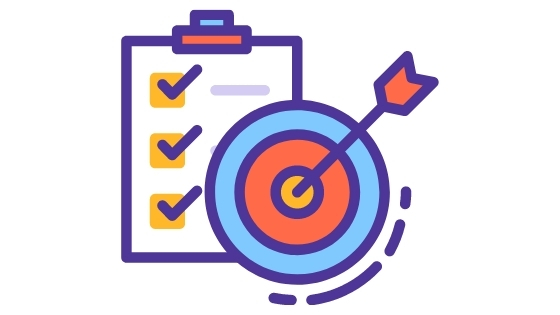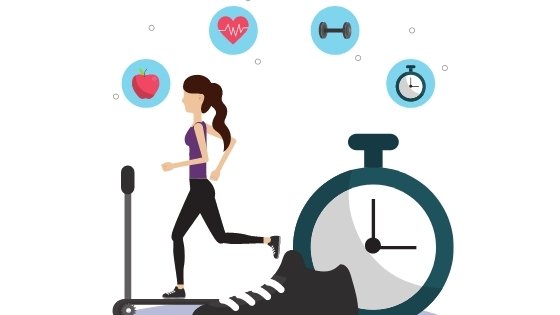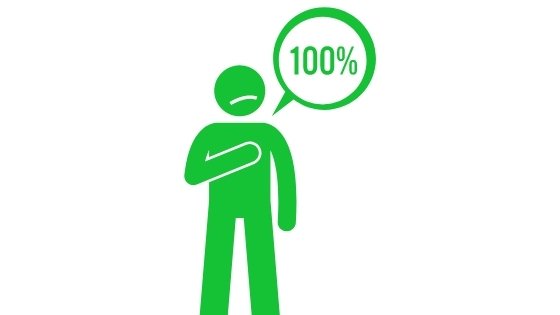Think Small Summary by Owain Service and Rory Gallagher teaches you how to set, plan, execute, and stick to your goals using behavioral insights. Think of this book as a guide to setting goals and achieving them.
Who Should Read Think Small Summary? And Why?
[amazon box=”1782439234″ template=”horizontal”]
If you lack direction in your life, struggle while setting goals, or find it hard to stick to them, you should read this summary.
This summary is also best for those trying to improve their goal-setting and face difficulties choosing proper goals.
Why should you read this book summary?
From whatever I have read so far, I found that successful people have burning goals that keep them alive.
This suggests that if you don’t have goals in your life, you won’t achieve anything worthwhile even though you’re grinding.
About The Authors
This book is written by two authors: Owain Service and Rory Gallagher.
“Owain Service is the managing director of the Behavioural Insights Team.”
BIT researches human behaviors and helps in making policies.
Through the knowledge and behavioral insights, they help the citizens of their country.
Think Small Book Summary (PDF)
In this book summary, you’ll learn all the lessons I learned from this book.
Excited, aren’t you?
Alright, here we go!
Chapter 1: “Set”

You want to achieve something, right?
And you’re probably working and hustling to achieve those goals.
You’d agree with me that without setting the right goals, one will end up wasting his time and effort.
The thing is:
Schools never teach us how to set the right goals.
Heck, some people don’t even care to set goals. They sail wherever ‘life’ takes them.
While some set goals only in their minds and never bother to write them on paper. And guess what happens? They forget about them after some time.
Setting appropriate and realistic goals is the first step of starting a good life.
How do you set goals? And how to find the right ones?
Let’s figure this out.
Before you think about your goals, you should ask yourself, “What do I want to achieve in my life?”
Most people either set too lofty or too small goals. And not to mention those who don’t even bother at all.
You must never make this mistake during goal setting.
Set one clear goal that is realistic and is achievable by a certain amount of effort. Then put a clear deadline.
Another mistake people make is that they forget about their well-being while setting goals. For instance, they forget that some goals are likely to provide more happiness than others.
The author (after research) found out that people who spend money on others felt happier than those who spent money on themselves. And there are many other examples like this.
Being human beings, we often fail to figure out what’s good for us overall. And usually set goals that don’t help us in the long term.
Make sure that you realize the consequences of your actions which you’d take after setting those goals and working towards them.
Your goals just aren’t yours all the time!
Depending on the intensity and size of your goal, it can affect the lives of others.
For instance, if your goal is to open a charity organization, it’d affect the lives of millions of needy people.
So while you set goals, understand their gravity.
What if one of your goals ends up in destroying other people’s goals? (Anything can happen.)
And that’s why goal-setting must be done meticulously and never be taken lightly.
The factors that you shouldn’t ignore while setting goals
1. “Social relationships” You can’t ignore social relationships as a human being.

“Social isolation has a similar effect to smoking fifteen cigarettes a day.”
Think Small: The Surprisingly Simple Ways To Reach Big Goals
You might ask, “What does this have to do with goal setting?”
Even I asked this question while reading the book myself. But I realized it has a lot to do with setting goals.
Just make sure that you don’t set goals that lead you toward an isolated life.
For example, writers like me have to sit in front of their laptops and write all day. And that usually comes at the cost of some social life.
2. “Health and wellbeing.”

You know how essential health and well-being are if you’re a personal development geek like me.
People who work on these factors stay more energetic and productive, which further helps them achieve big goals.
3. “Learning”

While setting goals, see if your goals would give you enough time, energy, and money to invest back in learning.
That’s because learning helps you in the long run. It can even help you accomplish those goals faster.
People often neglect this factor and wonder why they aren’t reaching closer to their goals.
Insight: Above three factors, directly or indirectly, find their way into almost every book I read. I hope this will give you an idea about how important these factors are and how ignoring these while setting goals could create problems in the future.
Chapter 2: “Plan”

Goal setting can be challenging, but planning is even more complex.
Here is the thing:
You don’t have to make planning harder. You don’t need to draw charts and spend time making long spreadsheets.
Keep it simple.
Yes! Simplicity is the key here.
Instead of overwhelming yourself with so many strategies, you should make them clear and simple to stick to.
Planning shouldn’t be a hindrance in your way of achieving goals. It’s there to make things simple. Ironically, many people forget that. They think that planning requires a professional strategist with a tedious application. It’s not like that.
Planning is there to make sure that things go smoothly and you accomplish your goals faster.
The authors talk about “limited cognitive bandwidth.” We often overestimate how much cognitive stamina we have and underestimate the amount of effort we are supposed to make.
Note: Out of the context of this book, there is a 10x rule, which says a similar thing.
But the truth is:
Your mind starts to take a toll when you assert pressure on it by doing tasks that demand cognitive ability.
Putting in simple words, you can’t solve two mathematical equations simultaneously. It’s like running heavy software and games on a machine with limited processing power.
That’s why planning before doing anything is crucial.
Remember, planning is there to save you from hassles while working towards your goals. So don’t make things complicated, well, unless you want to fail.
Divide and organize your tasks into simple and actionable steps.
Think small. Save your mental energy.
Caveat: Don’t skip planning. It will make things harder for you, depending on the complexity and scale of your goal.
Chapter 3: “Commit”

You have set goals. Made a sound plan. Now what?
The question is:
Do you have the will of fire to execute? Are you committed enough?
Most people fail here. They fail to muster enough will and strength to commit themselves to their goals.
Think about it. How often have you cheated on a daily exercise routine by skipping the gym with an excuse?
How many times did you give up on your goals when you realized they require tiresome deliberate effort? A lot, haven’t you?
Don’t worry. You aren’t alone.
So how do you strengthen your commitments?
One easy way is to make it public. This works like a charm.
When you make a commitment public, you develop an absolute fear of being ridiculed by your peers.
And that peer pressure pushes you to work on your commitments.
Another technique is to associate pain with your lack of commitment by setting milestones.
For example, you could promise your friend that you would give him something you like for a month.
That way, you’ll associate pain with the failure of losing your commitment.
Why does this work?
These techniques work because it’s human behavior. We love pleasure and try our best to avoid pain.
Sometimes, when the process gets tough, we associate it with pain and avoid tasks that we’ve committed to.
Also, you could develop habits that can help you stick to your commitments.
For instance, if you want to join a gym, you could develop the habit of rising early in the morning.
“Think Small” also works in the case of habits. Habits ensure that your brain spends less energy by automating repetitive tasks and developing patterns.
Either way, stay committed!
Chapter 4: “Reward”

A meaningful reward motivates you to stick to your goals despite the harsh and discouraging circumstances.
Reward also helps you complete the habit loop:
Cue->Routine->Reward
(I studied this in The Power Of Habit. It’s a basic concept.)
Therefore you must set meaningful rewards.
How do you set meaningful rewards?
The basic idea is that the reward should be something of value.
Although value is subjective here, it must be enough to worry you if you fail to stick to your goals or commitment.
In this chapter, Owain gives a behavioral insight: human behavior is such that the pain of loss is more than the pleasure of gain.
For instance (borrowing the example from this book), the pain of losing ten cents would be more than the pleasure of gaining ten cents.
How does this help in achieving goals?
You could set high-value rewards that you can’t afford to lose.
For example, your goal might be to earn a degree amid a recession. If you fail to achieve your goal, you will risk spending days without money. And you can’t afford that, right?
Moreover, the rewards you set should be related to your goals. Otherwise, they won’t matter to you.
Also, rewards should be clear and concise. You must clearly understand what you’ll get after you achieve your goal.
In the end, rewards give you a sense of satisfaction. And you realize that your efforts were worth taking.
Chunk your rewards and motivate yourself
You could also use the “chunking method” for setting rewards. It means you could divide your big reward into multiple smaller rewards such that you’d get one at the end of each milestone.
For example, if your business goal is to 10x your sales by the end of this year, you could reward yourself every time your sales multiply instead of rewarding yourself after achieving the entire goal.
Doing so would motivate and propel you towards completing further milestones.
Remember, habits are doing the magic here. Every time you reward yourself by achieving mini-goals, you prepare your mind for the future.
Never underestimate the power of chunking. Period.

The authors suggest that you share your goals with others and ask them for help if needed.
It may sound weird at first. That’s because people don’t really care about others in this busy world. All they care about is themselves.
But the authors’ research says something else. People are usually nicer than you might imagine. This means if you ask people for help, nearly half of them might help you.
You don’t need to keep the burden of your goals entirely on yourself. Ask for help.
There are plenty of reasons why people keep their goals to themselves.
One reason is the belief that nobody cares. This discourages individuals not to spread the word about their goals.
Another reason might be that people prefer to keep their weaknesses secret. For example, in countries where English isn’t a native language, people feel shy to tell that they want to work on their English speaking skills.
There are myriad weird reasons. Discussing them would take an entire blog post. So let’s keep this short.
Why sharing goals with others help?
When you share your goals with others, the “social power” starts doing its magic.
Put simply, you draw more power from other people and thus become more capable of achieving your goals (no matter how big they are.)
What can’t be done by you alone can be done by you and others combined.
It’s like humanity fighting against evil.
When you start taking your lofty goals seriously, you realize that they’ll require the help of other people who are willing to take your goals seriously.
Then you start to see the bigger picture and maintain perspective.
So long story short, don’t think of your goals as personal projects. Bring them out and share them with others. There is more to humanity than you might think.
Chapter 6: “Feedback”

It’s common sense that taking critical feedback from the right people is essential to measure your progress.
Otherwise, you will never know if you’re putting efforts in the right direction or not.
But it would be best if you keep a few things in mind while taking feedback.
“Feedback should be personal and in relation to your goals”
This doesn’t mean that you shouldn’t take feedback on things other than your goals.
The idea here is to focus more on feedback about the burning goals.
Make sure that the person giving you feedback believes in you and your goals. Otherwise, you might run into people whose advice will be worthless.
Taking feedback from the wrong person is like tearing your goals apart and putting yourself to hell.
How to put feedback to use?
You’ve taken feedback. Now, what should you do? How should you use that information and apply it in your work?
The thing is:
Feedback will be useless if you don’t act on it.
Let me share some steps which you could take after taking enough input.
- Find where you stand. This is pretty obvious. The sole purpose of taking feedback is to realize your current position and assessing what needs to be done.
- Compare with others. Once you know where you stand, have a look at the progress of other people who have similar goals as yours. Doing this would give a clear picture.
- Make future plans. In the end, the only thing that matters is that you make an actionable plan best suited to your goals.
I know that feedback might hurt your feelings sometimes, but you must swallow it down and use it to achieve your goals.
Chapter 7: “Stick”
This stage is where 98 percent of people fail.
You set goals. Plan hard. Make your goals public. Even start taking steps.
But sticking to goals takes more than that.
Some goals demand that you improve yourself and get out of that comfort zone. And this is where usually the going gets tough.

I recently read Chop Wood Carry Water by Joshua Medcalf. It says a lot about trusting the process.
I guess the authors tried to guide the reader in a similar direction.
By barely sticking to your goals and continuing working towards them, you could build momentum towards your goals.
Another advantage of sticking to the process is that you could test and figure out what you are doing right.
The process takes time. And this time gives you experience. Eventually, this experience allows you to learn and focus.
The best thing is to celebrate your journey after achieving your goals and remind yourself of all things you went through.
Caveat: Remember, you don’t have to keep doing things that aren’t working mindlessly. Keep your plans flexible and make necessary changes along the way by testing and learning.
The Key Takeaways From The “Think Small: The Surprisingly Simple Ways To Reach Big Goals”
Let’s wrap up the key points from this summary:
- Set clear and concise goals with effective rules and deadlines.
- Plan how you’ll tackle those goals.
- Make hard commitments with a harsh penalty on failing to commit.
- Reward yourself for accomplishment.
- Share your goals with people who might care.
- Take critical feedback from the right people and turn them into an actionable plan.
- Stick to the process. Have faith. Keep testing and adapt.
Think Small Quotes
“Small details matter a lot more than you might think. To achieve big, you’ll need to think small.”~Owain Service & Rory Gallagher
“We dream about a big house in the country, without realizing that the longer commute may make us less happy overall.”~Owain Service & Rory Gallagher
“If money doesn’t make you happy, you probably aren’t spending it right.”~Owain Service & Rory Gallagher
“Human beings care much more about losing something than they do about gaining something.”~Owain Service & Rory Gallagher
References
- The book itself: Think Small by Owain Service & Rory Gallagher.
- https://www.bi.team/about-us/
Think Small Book Review
[amazon box=”1782439234″ template=”horizontal”]
I read the ebook version of this book.
The best thing that I liked about this book is it’s easy to skim.
The authors have organized this book so that you could finish this book in an hour or so just by reading the main points.
Even the names of the chapters are made of a single word.
The authors share personal and other stories that give insights into human behavior.
Sometimes the authors talk about other topics like habits and happiness as well.
You would have some easy-to-apply takeaways after reading this book.
So far, this is one of the best books I have read on goal setting.
I didn’t find anything problematic in this book and recommend it to everyone.
Suggested Reading
I suggest that you read below summaries or articles and dig deeper:
This summary will teach you about the importance of the process.
This summary would help you find your reason for being with a proper framework.
In this article, you’ll learn tips about becoming more productive in everyday life.
Get A Learning Boost With Blinkist
What will you learn from Blinks?
- Simple ways to achieve big things.
- How to set clear targets and deadlines?
- Why you should keep experimenting and figure out what works for you?
Click here to learn more about Blinkist and sign up to start a 7-days FREE trial.
Did You Enjoy This Book Summary?
I hope Think Small Summary served you well.
Now it’s your turn.
What are your burning goals?
Have you made your action plan yet?
Are you facing difficulty in sticking to your goals?
Let me know in the comments below. I’ll read all your responses.
Don’t forget to share this article on social media. Thanks!
